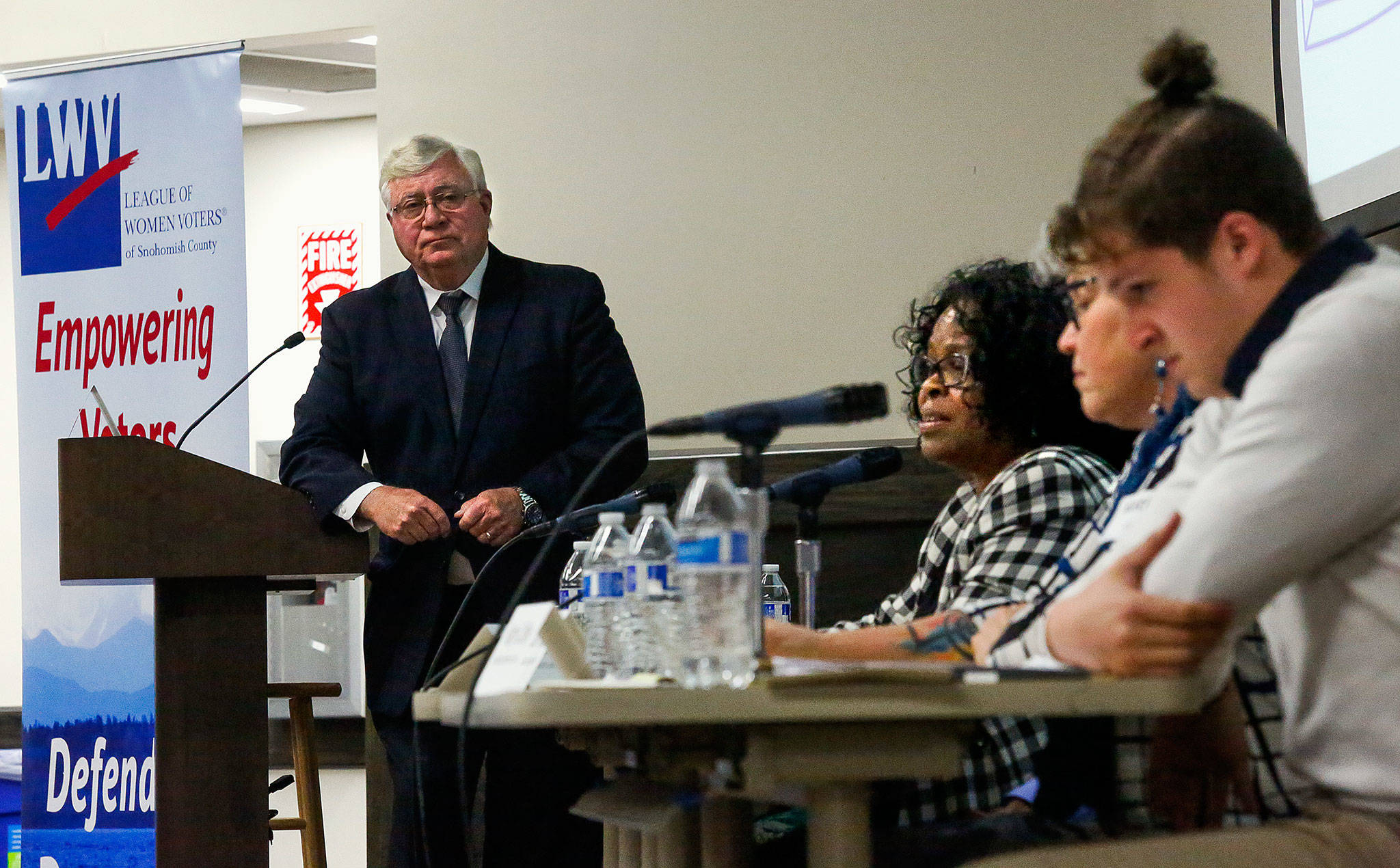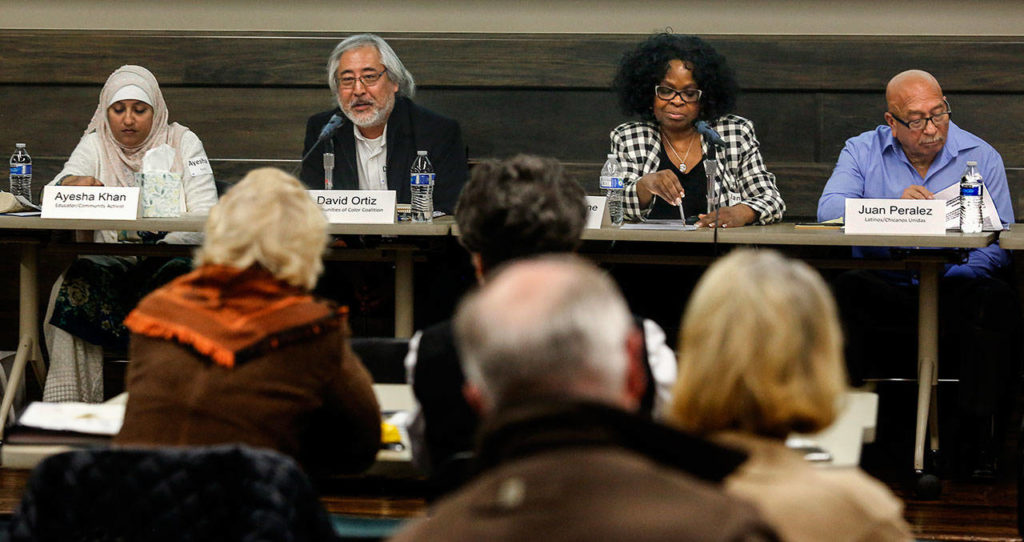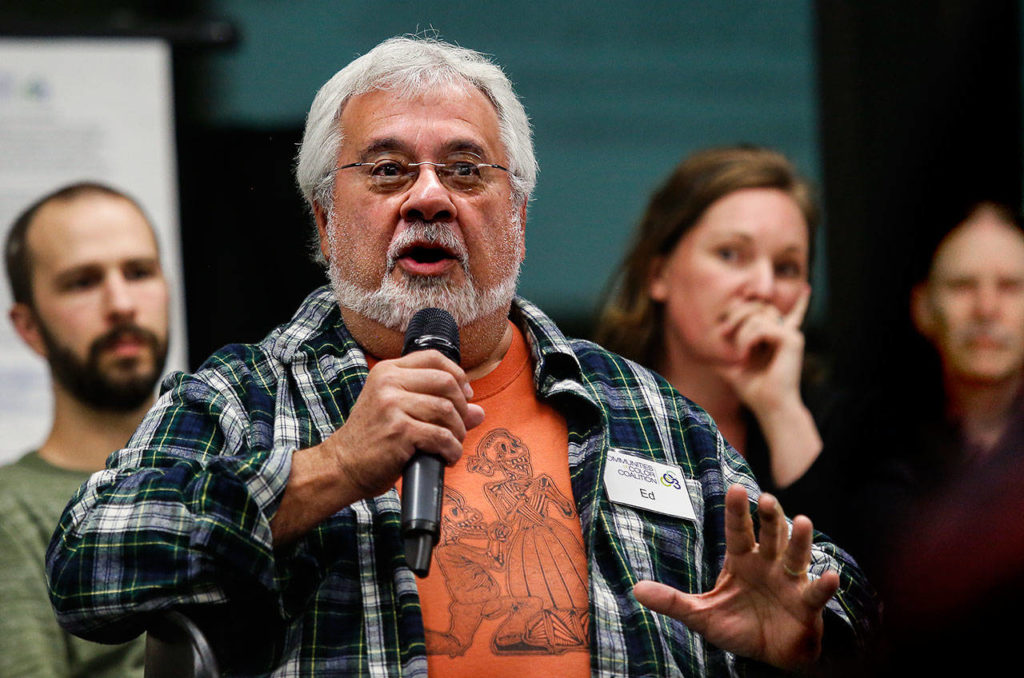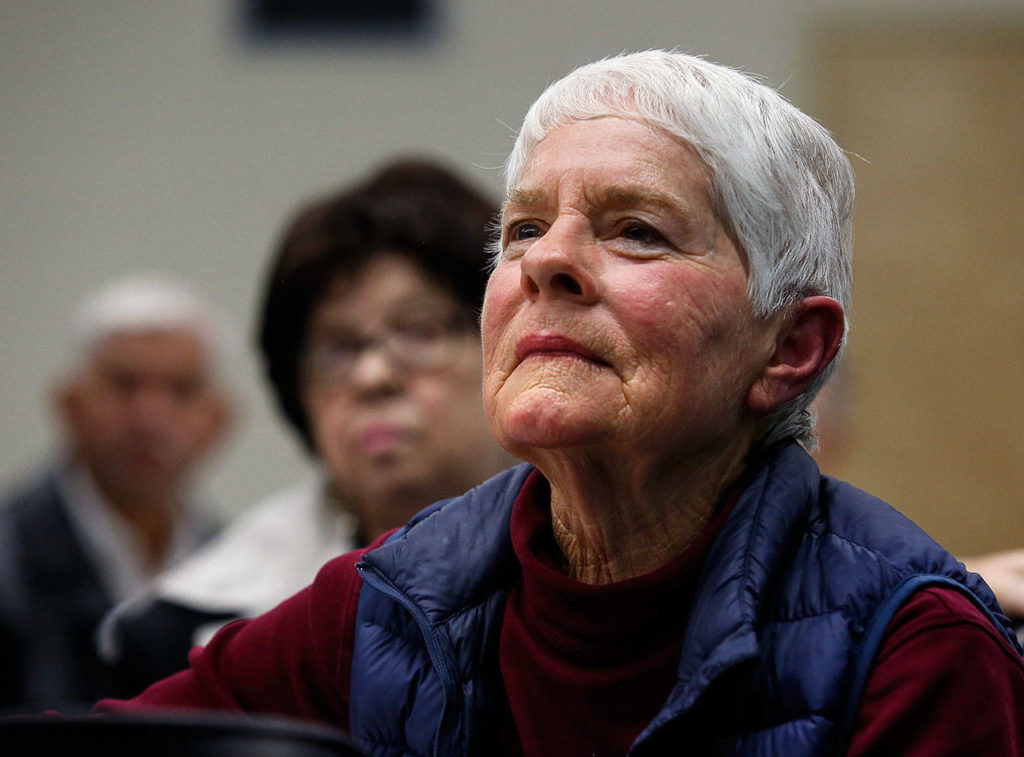There was more than a hint of irony in the timing of Wednesday’s Civil Discourse Forum. The event at Everett Community College coincided with news of crude explosive devices sent to high-profile critics of President Donald Trump.
Those packages — more turned up Thursday — weren’t mentioned during the forum sponsored by the League of Women Voters of Snohomish County. Yet hostile political rhetoric that seems to grow angrier by the day was much on the minds of six panelists in EvCC’s Jackson Center Wilderness Room.
“It’s best when everybody is heard,” said panelist Ayesha Kahn, a Muslim educator and activist from Mukilteo. Her husband, Mohammed Riaz Khan, has been in the news in recent years as the leader of a mosque with plans to build the Islamic Center of Mukilteo.
“Separate the message from the person,” said David Ortiz, chairman of the Communities of Color Coalition. “I don’t think it’s ethical to attack the person.”
Bob Drewel, acting as emcee, mentioned that the late U.S. Sen. Henry M. Jackson, for whom the college’s Jackson Center is named, was known to be “extraordinarily balanced” in his own discourse. Now a senior adviser at Washington State University in Everett, Drewel is a former EvCC president who later became Snohomish County executive.
Along with Ortiz and Ayesha Khan, the event’s panel on diversity included Janice Greene, president of the NAACP of Snohomish County; Juan Peralez, president of Unidos, a Lynnwood-based Latino-Chicano advocacy group; Kathy Coffey, executive director of Leadership Snohomish County; and Cameron Calder, social justice and current events coordinator for the Office of Student LIFE at EvCC.
Panelists answered prepared questions asked by Drewel during the forum’s first half. Later, small groups worked on questions that included “What steps can be taken to reduce the polarization that is impeding democracy?” At my table, talk centered around education.
“We need to teach tolerance,” said Sue Gaskin, a retired teacher who decried the lack of time in schools to “deal with matters that are real.”
The questions for panelists covered how they’ve been able to respond positively in negative situations, and who and what influenced them. They were asked to share memories of times when civil discourse was helpful, and when it failed them.
Questions sparked discussions of far-reaching experiences.
Calder, the EvCC student, said his activism began in a Snohomish High School civics class taught by the late Tuck Gionet. One class project took Calder to the Legislature, where he said he learned that representatives “are just people.” Gionet died of cancer in 2015. A progressive Democrat, Calder said Gionet didn’t share his personal political views with students. Calder said he learned later that the teacher he so admired was a Republican.
Peralez said the seeds of his activism were planted while growing up poor near the Mexican border, and later being part of a farm-worker family near Mount Vernon. By the mid-1970s, he was leading a Chicano student group at the University of Washington and organizing a campus boycott of head lettuce.
Saying she grew up during the civil rights era, Greene shared that she has been discouraged by the slow pace of change. “When I got older, working through the system, I’ve seen the need for civil conversation,” she said.
Still, Greene said it’s essential, when discussing issues as critical as racism and equality, to go beyond what she called our well-known “Northwest nice.”
“Sometimes we have to get past that,” Greene said. “We also need to have hard conversations.”
The evening began with a history lesson from Jason Ripper. An EvCC history instructor, Ripper disabused the audience of the notion that today’s polarized political rhetoric is the worst it’s ever been.
In the 1800 presidential election, Vice President Thomas Jefferson defeated incumbent President John Adams. Jefferson was with the Democratic-Republican Party, while Adams was part of the Federalist Party.
Newspapers at the time were so partisan — the Philadelphia Aurora for Jefferson and the Gazette of the United States for Adams — that Ripper termed them “dueling mouthpieces” akin to today’s MSNBC and Fox News. Quoting from the Gazette, Ripper read an attack on a future president, 1800s-style: “Shall I continue allegiance to God, or choose Jefferson and no good?”
Panelists talked of listening and considering the viewpoints of others, but said there are limits. They agreed that no one should take abuse, racist insults, or threats to their safety. “Call that crap out,” said Calder. “It’s our job to call it out.”
“We can care and be kind, but some people just don’t have that coming,” Drewel said.
And asked if civil discourse ever failed her, Coffey said the key is “knowing when to walk away.”
Julie Muhlstein: 425-339-3460; jmuhlstein@heraldnet.com.
Hear the forum
The Civil Discourse Forum, held at Everett Community College Wednesday, was recorded and will be broadcast at 6 p.m. Nov. 12 on KSER, 90.7 FM, and sister station KXIR, 89.9 FM.
Talk to us
> Give us your news tips.
> Send us a letter to the editor.
> More Herald contact information.




























